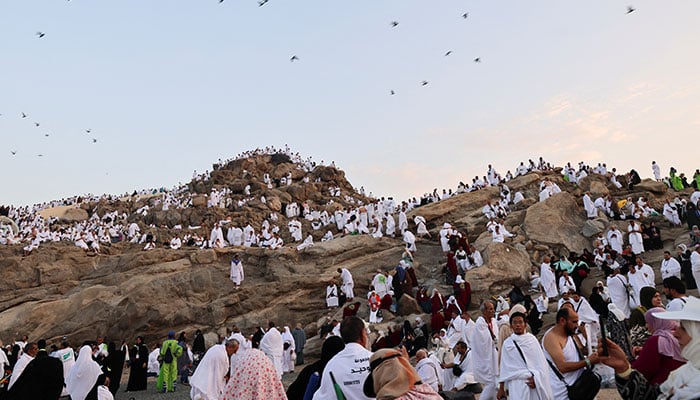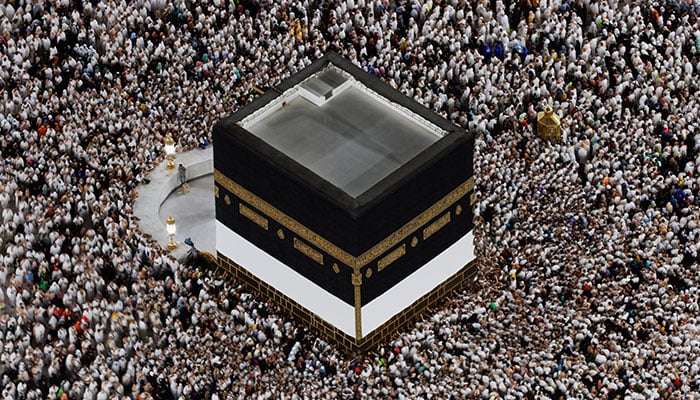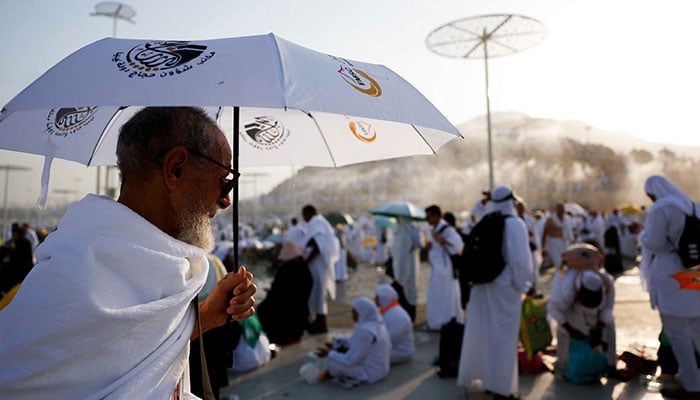Over 1.5m Muslims to reach Mount Arafat for Hajj 2024 today
Pilgrims are arriving at Jabal al-Rahmah and will later head to Masjid-e-Nimrah to hear Hajj sermon
More than 1.5 million Muslim pilgrims from at least 180 countries have begun arriving at the mount Arafat, to mark the "Day of Arafah" during the annual Hajj pilgrimage 1445 today (Saturday) on the ninth day of Zil Hajj.
Among the hundreds of thousands of international and domestic pilgrims, at least 160,000 Pakistanis will also perform the holy pilgrimage — a day after marking the beginning of Hajj on the Day of Tarwiyah from the tent city of Mina.
The pilgrims are arriving at the Jabal al-Rahmah — 70-metre (230-feet) hill, about 20 kilometres (12 miles) from Makkah, where the Prophet Mohammed (PBUH) gave his last sermon, reported AFP.
They will later head to Masjid-e-Nimrah to hear the Hajj sermon which will be delivered by Sheikh Maher Al Muaiqly, an imam at the Grand Mosque in Makkah.
The sermon will be translation in 50 different languages, including Urdu. Following the sermon, the pilgrims will offer Zuhr and Asr prayer in Arafah and leave for Muzdalifah at sunset.
After offering the Maghrib and Isha prayer in Muzdalifah, they will perform Rami al-Jamarat by collecting pebbles to carry out the symbolic stoning of the devil ritual in Mina on Sunday (tomorrow).
The pilgrims will then return to Makkah to celebrate Eid ul Adha and perform the sacrifice.
Hajj in the face of heat
The desert summer heat is expected to hit 43°C. The Hajj, which takes at least five days to complete and is mostly outdoors, "is not easy because it is very hot", said Abraman Hawa, 26, from Ghana.
"We have sun... but it is not as hot. But I will pray to Allah at Arafat, because I need his support," she added.
Saudi authorities have urged pilgrims to drink plenty of water and protect themselves from the sun. Since men are prohibited from wearing hats, many carry umbrellas.
More than 10,000 heat-related illnesses were recorded last year, 10% of them heat stroke, a Saudi official told AFP this week.
The Hajj, one of the world's biggest religious gatherings, is increasingly affected by climate change, according to a Saudi study that said regional temperatures were rising 0.4°C each decade.
But Mohammed Farouk, a 60-year-old Pakistani pilgrim, was not put off by the Gulf kingdom's scorching summer sun.
The Hajj is "very important for me as a Muslim", he said.
Financial windfall
The enormous crowds of worshippers spent the night in a giant tented city in Mina, a valley several kilometres outside Makkah, Islam's holiest city.
Many of them were tightly packed in the air-conditioned tents, lying close together on narrow mattresses.
They were grouped by nationality and price, depending on how much they had paid for their Hajj packages — usually several thousand dollars.
The Hajj is said to follow the path of the Prophet Mohammed's (PBUH) final pilgrimage, about 1,400 years ago.
It is an important source of legitimacy for the Al Saud dynasty, whose monarch has the title "guardian of the two holy mosques", in Makkah and Madina.
It is also a major financial windfall for the conservative country, which is trying to develop religious tourism as part of a drive to reduce its dependence on crude oil.
The kingdom received more than 1.8 million pilgrims last year for the Hajj, around 90% of whom came from abroad.
It also welcomed 13.5 million Muslims who came to perform Umrah, the small pilgrimage that can be done all year round, and aims to reach 30 million by 2030.
This year's Hajj takes place in the shadow of the Gaza war, after eight months of bloodshed that is an open wound for many in the Muslim world.
First stage of Hajj 'successfully completed'
Addressing a press conference in Makkah on the first day of Hajj at the Ministry of Information's Media Centre, the spokesperson of the Saudi Arabia's Interior Ministry said that the first stage of Hajj 1445 has been successfully completed.
The process of transferring the Hajj pilgrims to Mina was carried out as per the fixed schedule.
The spokesperson maintained that any attempt to disturb the peace of pilgrims and Hajj during the holy pilgrimage will not be tolerated.
"So far, 160 fake Hajj service establishments have been sealed, while 6,135 violators of Iqama rules were detained," the spokesperson added.
-
Murder suspect kills himself after woman found dead in Missouri
-
Poll reveals majority of Americans' views on Bad Bunny
-
Man convicted after DNA links him to 20-year-old rape case
-
California cop accused of using bogus 911 calls to reach ex-partner
-
'Elderly' nanny arrested by ICE outside employer's home, freed after judge's order
-
key details from Germany's multimillion-euro heist revealed
-
Search for Savannah Guthrie’s abducted mom enters unthinkable phase
-
Barack Obama addresses UFO mystery: Aliens are ‘real’ but debunks Area 51 conspiracy theories














